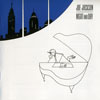JOE JACKSON : NIGHT AND DAY
- Another World
- Chinatown
- T.V. Age
- Target
- Steppin' Out
- Breaking Us in Two
- Cancer
- Real Men
- A Slow Song
Label : A&M Records
Release Year : 1982
Length : 41:54
Review (AllMusic) : 1982 will forever be known as the year that the punks got class - or at least when Joe Jackson and Elvis Costello, rivals for the title of Britain's reigning Angry Young Man - decided that they were not just rockers, but really songwriters in the Tin Pan Alley tradition. (Graham Parker, fellow angry Brit, sat this battle out, choosing to work with Aerosmith producer Jack Douglas instead.) Both had been genre-hopping prior to 1982, but Jackson's Night and Day and Costello's Imperial Bedroom announced to the world that both were "serious songwriters," standing far apart from the clamoring punkers and silly new wavers. In retrospect, the ambitions of these two 27-year-olds (both born in August 1954, just two weeks apart) seem a little grandiose, and if Imperial Bedroom didn't live up to its masterpiece marketing campaign (stalling at number 30 on the charts without generating a hit), it has garnered a stronger reputation than Night and Day, which was a much more popular album, climbing all the way to number four on the U.S. charts, thanks to the Top Ten single "Steppin' Out." Night and Day had greater success because it's sleek and bright, entirely more accessible than the dense, occasionally unwieldy darkness of Imperial Bedroom. Plus, Jackson plays up the comparisons to classic pop songwriting by lifting his album title from Cole Porter, dividing the record into a "night" and "day" side, and then topping it off with a neat line drawing of him at his piano in a New York apartment on the cover. All of these classy trappings are apparent on the surface, which is the problem with the record: it's all stylized, with the feel eclipsing the writing, which is kind of ironic considering that Jackson so clearly strives to be a sophisticated cosmopolitan songwriter here. He gets the cosmopolitan, big-city feel down pat; although the record never delivers on the "night" and "day" split, with the latter side feeling every bit as nocturnal as the former, his blend of percolating Latin rhythms, jazzy horns and pianos, stylish synths, and splashy pop melodies uncannily feel like a bustling, glitzy evening in the big city. On that front, Night and Day is a success, since it creates a mood and sustains it very well. Where it lets down is the substance of the songs. At a mere nine tracks, it's a brief album even by 1982 standards, and it seems even shorter because about half the numbers are more about sound than song. "A Slow Song" gets by on its form, not what it says, while "Target" and "Cancer" are swinging Latin-flavored jams that disappear into the air. "Chinatown" is a novelty pastiche that's slightly off-key, but nowhere near as irritating as "T.V. Age," where Jackson mimics David Byrne's hyper-manic vocal mannerisms. These all fit the concept of the LP and they're engaging on record, but they're slight, especially given Jackson's overarching ambition - and their flimsiness is brought into sharp relief by the remaining four songs, which are among Jackson's very best. There is, of course, the breakthrough hit "Steppin' Out," which pulsates anticipatory excitement, but the aching "Breaking Us in Two" is just as good, as is the haunting "Real Men" and the album opener, "Another World," a vibrant, multi-colored song that perfectly sets up the sonic and lyrical themes of the album. If all of Night and Day played at this level, it would be the self-styled masterpiece Joe Jackson intended it to be. Instead, it is a very good record that delivers some nice, stylish pleasures; but its shortcomings reveal precisely how difficult it is to follow in the tradition of Porter and Gershwin.
